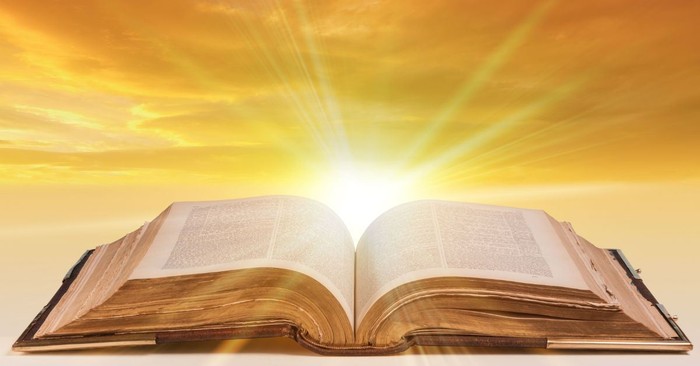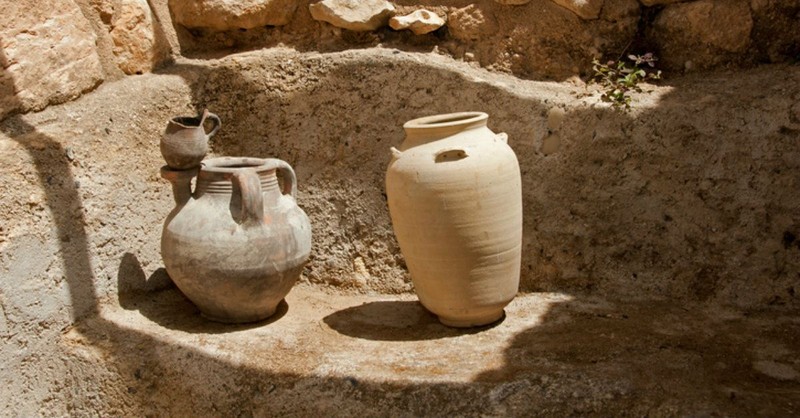
To understand mercy and grace we must first understand that we are undeserving of either, or their foundation - the love of God.
In his mercy, he does not dispense the full consequences of what we do deserve, and in his grace, he blesses us with many good gifts in spite of what we have done, giving us what we do not deserve. All of this reflects the fact that, “God demonstrates his own love for us in this: While we were still sinners, Christ died for us.” Romans 5:8
The life, death, and resurrection of Jesus Christ, the son of God brings about the perfect culmination of mercy and grace intertwined. And the Old Testament holds myriads of stories that reflect these precious characteristics of God. Here are 10 that draw our hearts to thankfulness today.
Photo Credit: Thinkstock/Mfotophile

1. Adam and Even were cast away from the Tree of Life.
We often see Adam and Eve being cast out of the garden as punishment, and in many ways it was. However, it was also mercy on the part of God. Had humanity continued to exist in the garden they would have had access to the tree of life while also living under the curse of sin.
“And the LORD God said, ‘The man has now become like one of us, knowing good and evil. He must not be allowed to reach out his hand and take also from the tree of life and eat and live forever.’ So the LORD God banished him from the Garden of Eden to work the ground from which he had been taken. After he drove the man out, he placed on the east side of the Garden of Eden cherubim and a flaming sword flashing back and forth to guard the way to the tree of life.” Genesis 3:22-24
We rarely look at the expulsion from the Garden as a mercy because our hearts still long for Eden, but an eternity separated from God due to the depravity of sin alive within us, would have meant the ache we feel for paradise would have never been soothed.
The flaming sword meant a lifetime living in a world steeped in the effects of the fall. And it kept us from an eternity of battling the flesh’s desires. It was the beginning of the path that would lead to Jesus’ conquering sacrifice that provided access to an eternity with God in perfection.
Photo Credit: Unsplash/Reza Shayestehpour

2. Hagar was seen.
Hagar was swept into the waiting game of Abram and Sarai and fell victim to their scheming to see God’s promises come to fruition in their own timing. It is a dramatic tale of jealousy and dissention, but also showcasing the character of God.
Hagar was sent to lie with Abram so that he might have a son. But when she became pregnant, the hearts of both wife and maidservant began to war. Hagar fled because of Sarai’s jealousy and envy, but God reached out to her. After hearing from the LORD, “She gave this name to the LORD who spoke to her: ‘You are the God who sees me,’ for she said, ‘I have now seen the One who sees me.’” Genesis 16:13
Though her circumstance did not change, she knew she was not alone in her suffering. What a grace it is to know that God sees us. He sees the sorrow, betrayal, successes, and joys. He does not look away from us, but sees deeply into our hearts, also seeing the covering and reflection of his son.
We have all felt the injustice of being treated unfairly by another. In Hagar’s plea to El Roi, we too can be reminded that we are seen.
Photo Credit: Thinkstock/grinvalds

3. Israel crossed the Jordan.
God is the God who makes a way through paths that seem impossible. He led the Israelites from Egypt by opening the Red Sea, and as the wandering Hebrews finally were on the brink of entering the promised land, God stopped the waters again at the river Jordan.
“Now the Jordan is at flood stage all during harvest. Yet as soon as the priests who carried the ark reached the Jordan and their feet touched the water’s edge, the water from upstream stopped flowing. It piled up in a heap a great distance away, at a town called Adam in the vicinity of Zarethan, while the water flowing down to the Sea of the Arabah (that is, the Dead Sea) was completely cut off. So the people crossed over opposite Jericho.” Joshua 3:15-16
God’s miracles of mercy were bookends to the Hebrews’ Exodus from captivity. Because hundreds of years later, the river Jordan would serve as the location where Jesus began his public ministry, meaning freedom for all who place their trust in him.
Photo Credit: Unsplash/Eberhard Grossgasteiger

4. Ruth was redeemed.
The book of Ruth is a beautiful narrative of God’s care and provision. She was a Moabite, born outside of God’s chosen people, but in mercy, he drew her near. She was a widow bound, out of love, to a mother-in-law whose grief made her bitter.
In just four chapters God unveils his love for this immigrant and redeems a familial line many would have written off as doomed—a family line that led to Jesus.
Kelly Mitner says of Ruth that, “She has lost, she has loved, and now she is leaving a legacy.”
Ruth is the Great-grandmother of David who would slay lions and giants as he sought after the glory of God, and Naomi’s bitterness was turned sweet as she experienced the mercy of a loyal daughter-in-law and the grace of a kinsmen redeemer. There is grace in the gift of legacy, one we should all risk praying for. That God might take a simple life full of ups and downs and make it into something that has a lasting impact on the Kingdom of God.
Photo Credit: Unsplash/Nitin Bhosale

5. Nathan rebuked King David.
We should never downgrade the value of a friend who is willing to confront us with our sin that would otherwise drag us to destruction. We cannot overlook those willing to shine light on the darkness closing in on our lives; they are evidence of the grace and mercy of God.
Such grace is shown when Nathan gives David the gift of seeing his life from the perspective of another. Nathan constructs a story that closely parallels how David himself worked against Uriah but uses a lamb in the place of Bathsheba. After hearing Nathan’s tale of stolen livestock, “David's anger was greatly kindled against the man, and he said to Nathan, ‘As the Lord lives, the man who has done this deserves to die, and he shall restore the lamb fourfold, because he did this thing, and because he had no pity.’” 2 Samuel 12:5-6
Under the grace that was given to him, David shows his own desperate need for mercy as well, for he spoke what should be the sentence for his own sin from his mouth. Nathan, with gentle strength, leads him to the realization that has David pleading to God and seeking repentance. “Hide your face from my sins and blot out all my iniquity. Create in me a pure heart, O God, and renew a steadfast spirit within me.” Psalm 51:9-10
May being renewed be our own plea as well.
Photo Credit: Unsplash/Josh Applegate

6. Elijah was fed by ravens.
Too often we are worried about how God will supply for the needs we have, but this story from 1 Kings 17 should shut down all the whispers that speak fear into our circumstances and leave us resting in grace instead.
Here Elijah is fed by ravens as he journeys to the places where God has called him, “The ravens brought him bread and meat in the morning and bread and meat in the evening, and he drank from the brook,” 1 Kings 17:6. This is a simple story of wonder with a simple truth: if God wants us to be provided for, nothing can stop him, even if it means sending animals to do what is needed.
Photo Credit: Unsplash/Samuel Zeller

7. God provided for the widow.
This story from 2 Kings 4:1-7 tells the plight of a woman who has lost her husband and is now faced with debts she cannot pay. The debt collectors are on their way to collect her sons and make them slaves when the widow seeks Elisha for help. Instead, Elisha simply tells her to shut her door, pour out all she has, and trust in God.
Jill Briscoe points out that Elisha knew there would be days we think we have nothing, and that we must look to God for provision. Briscoe says, “If [Elisha] had invited himself into the widow’s small house and worked the miracle for her, then no one would have been surprised. After all, this was a mighty man of God; what would you expect? But this time, wisely, Elisha insisted the miracle be between the widow and God—so she could see how sufficient the Lord really was for her.”
The widow began to pour the small jar of oil into the jars Elisha had encouraged her to collect, and it flowed and flowed until all the jars were filled. God in his grace supplied all (and more) that she needed.
Photo Credit: Facebook/compuinfoto

8. God answered Job.
People so often think the book of Job is about suffering alone, but if we think of that as its only theme, we miss out on the stunning portrayal of God’s glory in its verses.
The grace here comes in that God actually answers Job. We in our humanness are tempted to think that Job has a right to hear from God after all he has experienced, but even in that, we reveal our low view of God. God does not owe anyone anything. We have all fallen short of his glory—even the righteous Job. And yet, God reaches down. God answers a mere man. He does not pamper Job with false comfort, but even more rightly reveals more of his own self. He says, “Would you discredit my justice? Would you condemn me to justify yourself? Do you have an arm like God’s, and can your voice thunder like his?” Job 40:8-9
We need to understand the mightiness of God to comprehend the full power that constructs the mercy that he lavishes upon us. That he would speak to us, give his word to us, and rescue us should leave us humbled and awestruck.
Photo Credit: Thinkstock

9. Three were rescued from the firey furnace.
Children immediately recognize the gift of grace in this story, but too often adults pass it by. Three faithful seekers of God, Shadrach, Meshach, and Abednego, were sentenced to death by fire for their refusal to bow to a false god. Many would hope that the grace and the mercy of God would show up before flames whipped around them, but this story teaches us that we are not the ones who get to decide when these gifts rain down.
Not until the three stood in the flame did the provision of God become visible. Not one of the three burned as four stood in the furnace. The fourth man may have been a theophany, an Old Testament appearance of Christ, or it may have been an angel, but it was definitely provision sent from God.
Nebuchadnezzar had asked them before what looked to be their deaths, “Then what god will be able to rescue you from my hand?” Daniel 4:16 The living God did not shy away or hide his face when the proper time came to show the power of the God who can rescue.
Photo Credit: Unsplash

10. Hosea pursued Gomer.
The love story locked in the pages of the book of Hosea is one that can leave the reader with mixed emotions, but it illustrates a point all Christians come to understand as they begin to comprehend the realities of the grace of God—His grace is scandalous.
Gomer was a prostitute who was unfaithful to her husband, Hosea, time and time again. Her plight and the merciful love of Hosea is to be a reflection of Israel and God’s merciful love towards them. Of Gomer the scriptures say, “She will chase after her lovers but not catch them; she will look for them but not find them. Then she will say, ‘I will go back to my husband as at first, for then I was better off than now,’” Hosea 2:7.
Not one of us wants a lover like that, but oh, how we have treated God in such a way. Our hearts often wander from the one who is faithful to us. We sell our time, passions, and effort to things that will never love us back, and we wonder why our life does not fill the empty places within us. As we look up from the pits we dig ourselves into, we see that God opens doors of hope for us to walk through, that his mercy and grace await and his love remains.
The mercy and grace of God are seen over and over in the Bible. The relationship the Lord has with humanity could not exist without them. They present themselves as both characteristics and actions of God, and we should be forever thankful that he shares them with us.
 Chara Donahue is a co-author of the Bible study 1, 2 & 3 John: Experiencing Transformation and is working on her next book. She enjoys serving as a biblical counselor, speaking to women, and savoring coffee when her four kids are out playing with dad. She holds an MSEd from Corban University, is passionate about seeing people set free through God's truths, and is the founder and editor of Anchored Voices. Get in touch with her on Facebook or Twitter.
Chara Donahue is a co-author of the Bible study 1, 2 & 3 John: Experiencing Transformation and is working on her next book. She enjoys serving as a biblical counselor, speaking to women, and savoring coffee when her four kids are out playing with dad. She holds an MSEd from Corban University, is passionate about seeing people set free through God's truths, and is the founder and editor of Anchored Voices. Get in touch with her on Facebook or Twitter.
Photo Credit: Thinkstock/oneinchpunch
Originally published Thursday, 06 December 2018.







